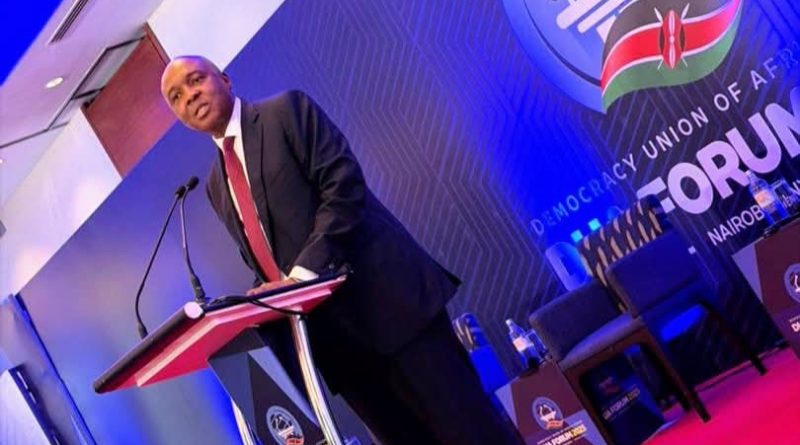Saraki calls for African renaissance, urges end to dependency at Nairobi Forum
Former Senate President of Nigeria, Bukola Saraki, has urged African leaders to dismantle economic and institutional dependency and chart a new course of self-reliance, innovation, and prosperity.
Delivering a keynote address at the Democracy Union for Africa Forum in Nairobi, Kenya, themed “Navigating Africa’s Strategic Position in a Multipolar World: Towards Equitable and Mutually Beneficial Partnerships,” Mr Saraki said Africa must “end the mindset that progress must come from elsewhere” and “build institutions that outlive individuals.”
The session, titled “Ending Dependency: Rethinking Africa’s Path to Prosperity,” gathered policymakers, scholars, and development leaders across the continent, on Monday.
Africa’s unfinished independence
Mr Saraki observed that more than six decades after independence, Africa’s project of full sovereignty—economic, political, and intellectual—remains incomplete.
“Our economies still echo colonial designs: systems of extraction and export, where raw materials leave our shores at minimal value and return as finished goods commanding prices we do not control,” he said.
He warned that the continent’s young population and vast resources could either become “a source of prosperity or a source of unrest and wasted promise,” depending on how leaders respond.

Weak institutions and leadership deficits
Mr Saraki traced Africa’s dependency to inherited colonial systems that prioritized control over development. He said many post-independence governments failed to build strong, accountable institutions.
“When institutions are weak, vision is easily short-circuited and dependency entrenched,” he noted, adding that executive dominance, weak parliaments, and politicized judiciaries have undermined sustainable growth.
He also faulted successive African leaders for pursuing power over purpose. “Leadership has too often been treated as possession rather than stewardship,” he said, calling for visionary and ethical governance that transcends politics and prioritizes continuity.
Aid, loans, and misaligned priorities
The former Senate President cautioned against Africa’s overreliance on aid and concessionary loans. He revealed that while serving in Nigeria’s Senate, he faced political pushback for demanding accountability on foreign loans.
“Many of these loans are accepted as if they are free gifts, yet repayment obligations remain,” Mr Saraki said. He criticized donor-driven development models that serve external interests, citing examples where aid priorities neglected local needs such as malaria prevention.
Seizing a multipolar opportunity
As the world transitions from a unipolar to a multipolar system, Mr Saraki argued that Africa must “shape its own future rather than be shaped by others.”
“Our resources, youthful population, and renewable potential position Africa as one of the most coveted investment frontiers. The question is: will we let the world define our future—or will we define it ourselves?” he asked.
Dismantling dependency: the pillars of change
Mr Saraki outlined a comprehensive roadmap for Africa’s transformation anchored on economic diversification, institutional reform, and mindset change. He said the continent must replace extraction with production, strengthen domestic finance, drive industrialisation, deepen regional trade, mobilise capital, invest in human capacity, and rebuild governance systems from the ground up.
He urged African nations to stop exporting raw materials and focus on value addition. “Africa accounts for 70 percent of global cocoa output yet captures less than 5 percent of the 130 billion dollar global chocolate market,” he said. “We export bauxite at 65 dollars per ton and import aluminium at 2,300 dollars per ton. We dig for others to profit.”
Mr Saraki also called for stronger domestic resource mobilisation, citing the growth of Afreximbank from 6 billion to 44 billion dollars in assets as evidence that African-led finance can fund African ambitions. “No nation has ever achieved sustainable development on borrowed capital,” he said, stressing that local capital formation and financial discipline are key to independence.
He identified industrialisation and export-led growth as central to Africa’s economic renewal. Manufacturing, which currently contributes about 12 percent to Africa’s GDP, must rise to at least 20 percent, he said. This, he added, requires investments in industrial parks, reliable energy systems, and vocational education. “Industrialisation is not simply about factories—it is about dignity,” he said.
Mr Saraki emphasised that with intra-African trade still below 15 percent, the African Continental Free Trade Area must move from policy to practice. “No region has ever prospered by trading little with itself,” he said, urging the harmonisation of regulations, customs, and transport systems to make trading across African cities seamless.
He described the mobilisation of local and diaspora capital as another pillar of self-reliance. Africans abroad remitted 95 billion dollars in 2024—almost matching foreign direct investment. “This shows enduring trust and connection. Africans must invest in Africa,” he said, calling diaspora and domestic capital “a declaration of independence.”
With 60 percent of Africans under 20, Saraki said the continent’s youth are its greatest resource. “A youthful population is not automatically a dividend; it is a duty,” he said. He urged governments to prioritise investment in STEM education, digital skills, and entrepreneurship, describing innovation as the key to Africa’s transformation.
Mr Saraki concluded that leadership, governance, and electoral reform remain the foundation for every other change. “Good governance is strategic capital,” he said, urging African countries to strengthen electoral systems and judicial independence. He described these institutions as “the twin engines of Africa’s renewal.”
READ ALSO: 35 states recorded N17 trillion revenue in 2024, yet remain dependent on FAAC — BudgIT
A call for a new African renaissance
Mr Saraki ended his address with a call for a continental rebirth built on dignity, innovation, and shared vision. “The future we seek will not be given—it must be claimed,” he declared. “Africa’s destiny will not be defined in the boardrooms of Washington, Beijing, or Brussels, but in the imagination and conviction of Africans themselves.”
He challenged the next generation to believe that nothing is impossible and to reclaim Africa’s narrative. “Let this be the chapter where dependency ends and dignity begins,” he said. “Let this be the chapter where Africa no longer waits to be invited to the global table, but confidently crafts its own and sets the agenda.”

